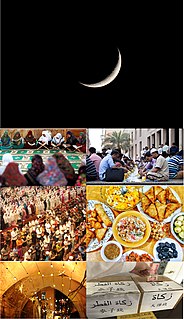A Prayer Before Dawn may refer to:
A Prayer Before Dawn may refer to:
The Five Pillars of Islam are fundamental practices in Islam, considered to be obligatory acts of worship for all Muslims. They are summarized in the famous hadith of Gabriel. The Sunni and Shia agree on the basic details of the performance and practice of these acts, but the Shia do not refer to them by the same name. They are: Muslim creed, prayer, charity to the poor, fasting in the month of Ramadan, and the pilgrimage to Mecca for those who are able.

Ramadan is the ninth month of the Islamic calendar, observed by Muslims worldwide as a month of fasting (sawm), prayer, reflection and community. A commemoration of Muhammad's first revelation, the annual observance of Ramadan is regarded as one of the Five Pillars of Islam and lasts twenty-nine to thirty days, from one sighting of the crescent moon to the next.

In the practice of Christianity, canonical hours mark the divisions of the day in terms of fixed times of prayer at regular intervals. A book of hours, chiefly a breviary, normally contains a version of, or selection from, such prayers.
A guardian angel is a type of angel that is assigned to protect and guide a particular person, group or nation. Belief in tutelary beings can be traced throughout all antiquity. The idea of angels that guard over people played a major role in Ancient Judaism. In Christianity, the hierarchy of angels was extensively developed in the 5th century by Pseudo-Dionysius the Areopagite. The theology of angels and tutelary spirits has undergone many changes since the 5th century. The belief is that guardian angels serve to protect whichever person God assigns them to.
Matins is a canonical hour in Christian liturgy, originally sung during the darkness of early morning.

The Isha prayer is one of the five mandatory salah. As an Islamic day starts at sunset, the Isha prayer is technically the second prayer of the day. If counted from midnight, it is the fifth prayer of the day.

The Fajr prayer is one of the five mandatory salah, to be performed anytime starting from the moment of dawn, but not after sunrise. As an Islamic day starts at sunset, the Fajr prayer is technically the third prayer of the day. If counted from midnight, it is usually the first prayer of the day. The Isha prayer, the daily prayer directly before the Fajr prayer, usually does not take place after midnight.
Witr is an Islamic prayer (salat) that is performed at night after Isha or before fajr. Witr has an odd number of raka'at prayed in pairs, with the final raka'ah prayed separately. Therefore, as little as one raka'ah can be prayed, and eleven at most. Although most Hansfis pray 3 raka'ah with dua qunoot in the third raka'ah.

Shacharit[ʃaχaˈʁit], or Shacharis in Ashkenazi Hebrew, is the morning tefillah (prayer) of Judaism, one of the three daily prayers.

In Islam, fasting is the practice of abstaining, usually from food, drink, smoking, and sexual activity. During the holy month of Ramadan, Sawm is observed between dawn and nightfall when the adhan of the Maghrib prayer is sounded. Ramadan is the ninth month of the Muslim lunar calendar and fasting is a requirement for Muslims as it is the fourth of the five pillars of Islam.

Sahūr or Suhūr, also called Sahari, Sahrī or Sehri is the meal consumed early in the morning by Muslims before fasting (sawm), before dawn during or outside the Islamic month of Ramadan. The meal is eaten before fajr prayer. Sahur corresponds to iftar- the evening meal during Ramadan, replacing the traditional three meals a day, although in some places dinner is also consumed after iftar later during the night.

A Rak'ah is a single iteration of prescribed movements and supplications performed by Muslims as part of the prescribed obligatory prayer known as salah. Each of the five daily prayers observed by Muslims consist of a number of raka'at.

Tahajjud, also known as the "night prayer", is a voluntary prayer performed by followers of Islam. It is not one of the five obligatory prayers required of all Muslims, although the Islamic prophet, Muhammad was recorded as performing the tahajjud prayer regularly himself and encouraging his companions too.

In Islamic legal terminology, bāligh or mukallāf or muhallāq or murāhiq or muhtalim refers to someone who has reached maturity or puberty, and has full responsibility under Islamic law.

In Islam, a nafl prayer or supererogatory prayer, also called as Nawafil Prayers, is a type of optional Muslim salah. As with sunnah prayer, they are not considered obligatory but are thought to confer extra benefit on the person performing them. An example is the offering of four raka'ahs of "nafl" before the compulsory Zuhr prayers.
Fajr, an Arabic word meaning "dawn", refers to the Muslim dawn prayer.

The Benedictus, given in Gospel of Luke 1:68–79, is one of the three canticles in the first two chapters of this Gospel, the other two being the "Magnificat" and the "Nunc dimittis". The Benedictus was the song of thanksgiving uttered by Zechariah on the occasion of the circumcision of his son, John the Baptist.
Before Their Eyes is an American post-hardcore band from Findlay, Ohio, United States. The band is currently signed to InVogue Records.

A Prayer Before Dawn is an album led by saxophonist Pharoah Sanders recorded in 1987 and released on the Theresa label that year.

A Prayer Before Dawn is a 2017 biographical prison film directed by Jean-Stéphane Sauvaire, written by Jonathan Hirschbein and Nick Saltrese and starring Joe Cole. It is based on the book A Prayer Before Dawn: My Nightmare in Thailand's Prisons by Billy Moore. The film had its world premiere at the Cannes Film Festival on 19 May 2017. It was released in the United Kingdom on 20 July 2018, by Altitude Film Distribution, and in the United States on 10 August 2018, by A24.